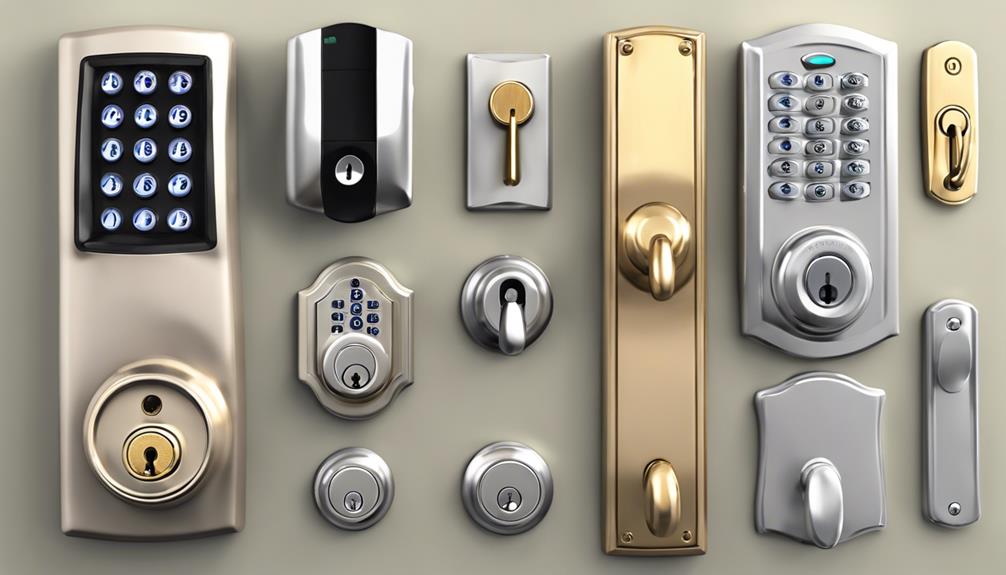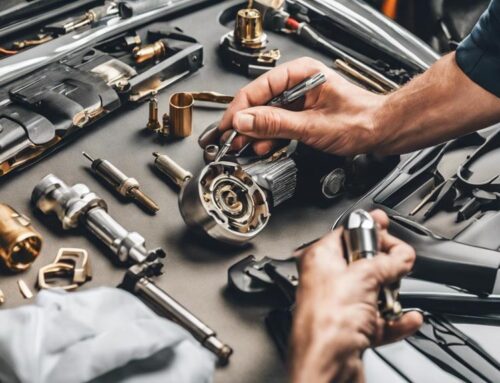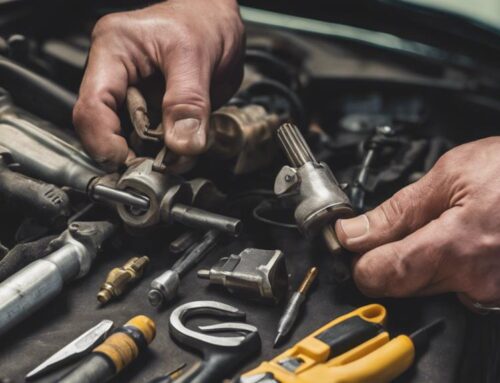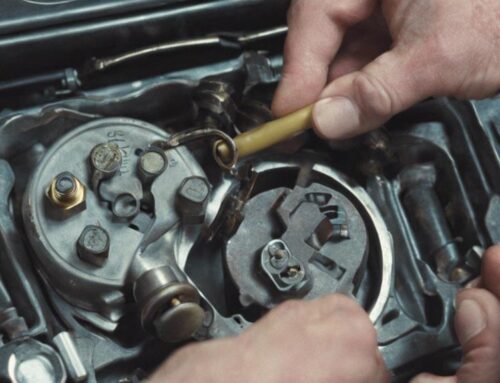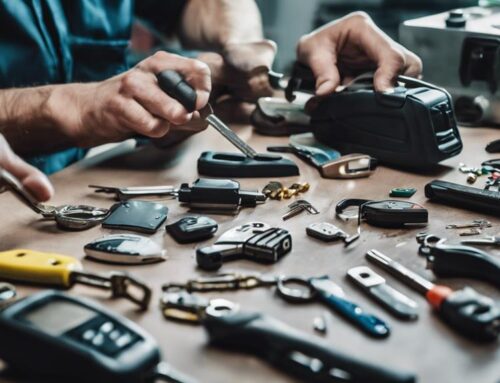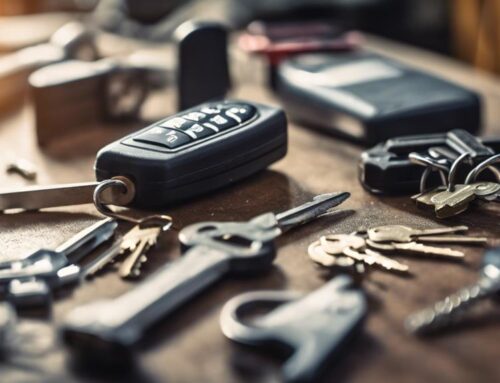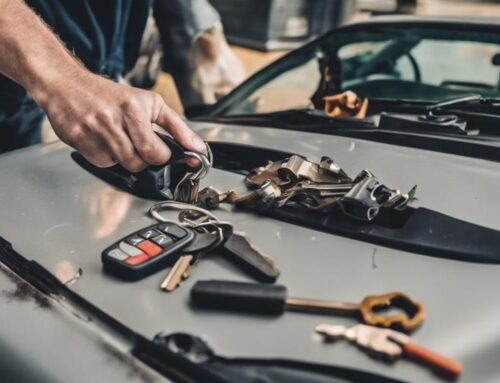When looking to upgrade your locks, various options are available for replacement, including traditional, smart, electronic, and high-security locks. Traditional locks, made of durable materials like brass and steel, provide a trusted safeguard for your property. Smart locks offer innovative features such as keyless entry and remote access control through smartphones. Electronic locks provide enhanced security with keyless entry and user-friendly interfaces. High-security locks, designed for maximum protection, feature advanced mechanisms like pick-resistant cylinders. Each type caters to different security needs and preferences, ensuring your property remains safe and secure.
Key Takeaways
- Traditional locks can be replaced with smart, electronic, or high-security options for enhanced security.
- Smart locks offer keyless entry and remote access control via smartphones, providing modern alternatives.
- Electronic locks provide keyless entry, multiple user codes, and advanced encryption technology for superior protection.
- High-security locks feature advanced mechanisms like pick-resistant cylinders and reinforced strike plates for maximum protection.
- Upgrading locks to smart, electronic, or high-security options enhances property safety against potential intruders.
Traditional Locks
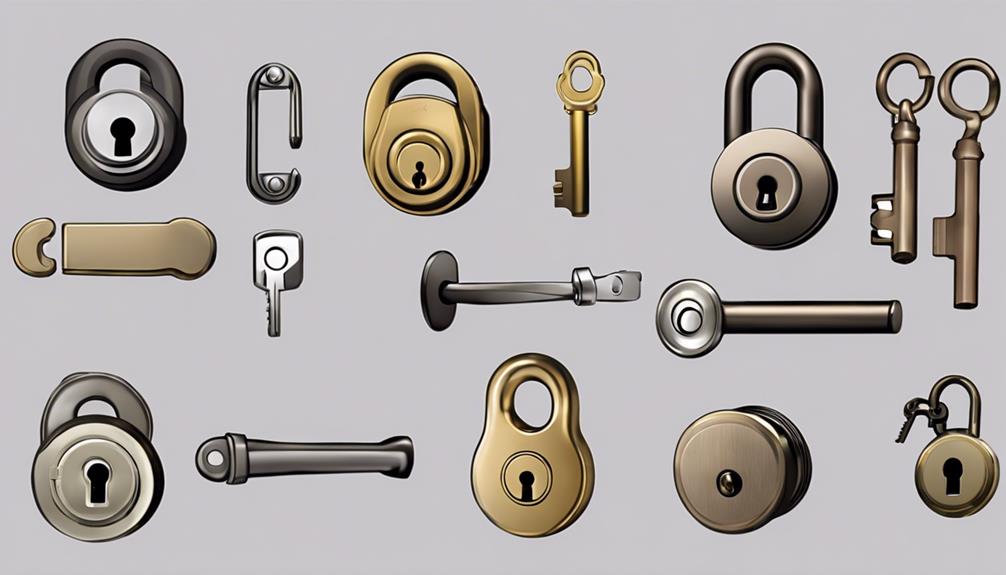
When it comes to the domain of security, traditional locks have long been a trusted method for safeguarding homes and businesses. These locks, often made from durable and reliable traditional materials like brass and steel, have been the go-to choice for securing doors for generations. To guarantee your traditional locks continue to provide exceptional security, regular lock maintenance is key. This includes lubricating the lock mechanism, checking for loose screws, and making sure the key operates smoothly. By taking the time to perform routine lock maintenance, you can extend the lifespan of your traditional lock and keep your property secure. Remember, a well-maintained lock is a happy lock!
When selecting traditional locks for your home, it's crucial to take into account factors like security grade and compatibility with your door type. These considerations will help you choose the right lock that provides both security and convenience for your home.
Smart Locks
With the advancement of technology in the domain of security, smart locks have emerged as a modern and innovative alternative to traditional locking mechanisms. Smart locks offer a range of benefits that can enhance your home security. One key advantage is the convenience they provide; you can control access to your home remotely through your smartphone. Smart locks also offer customization options, allowing you to create unique access codes for different users. Additionally, many smart locks have advanced features such as keyless entry and activity logs, giving you greater control and insight into your home's security. If you're curious about the benefits and drawbacks of smart locks, you can explore more information in our detailed guide on Smart Locks: Weighing the Benefits and Drawbacks.
Electronic Locks
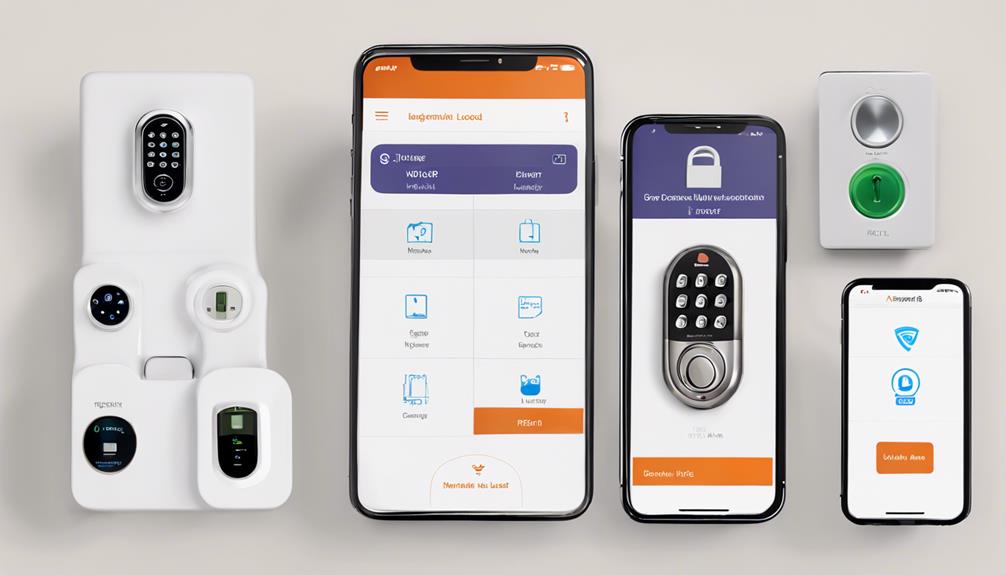
As technology continues to revolutionize home security, electronic locks have become a popular choice for homeowners seeking advanced locking solutions. Electronic locks offer keyless entry convenience and enhanced security features. These locks are powered by batteries, so it's crucial to take into account their battery life to avoid being locked out unexpectedly.
| Electronic Lock Features | Description |
|---|---|
| Keyless Entry | Easily enter your home without fumbling for keys. |
| Enhanced Security | Advanced encryption technology for superior protection. |
| Remote Access | Control your lock from anywhere using a smartphone app. |
| Battery Life | Check battery levels regularly to prevent lockouts. |
| Multiple User Codes | Assign unique codes for family members or guests. |
High-Security Locks
When considering high-security locks, it's crucial to compare the security features they offer to guarantee your property's safety. These locks often come with advanced mechanisms such as pick-resistant cylinders and reinforced strike plates. Installation considerations like compatibility with your door type and the expertise required for setup should also be carefully evaluated for peak security. High-security lock brands like Medeco and Abloy offer models with innovative features to maximize protection against unauthorized access.
Security Features Comparison
High-security locks are designed to provide an extra layer of protection for your property. When comparing security features, these locks often include advanced mechanisms such as drill-resistant cylinders, hardened steel bolts, and anti-picking pins. They are built to withstand tampering attempts and provide peace of mind for homeowners looking to upgrade their security. High-security locks require minimal maintenance but offer significant security upgrades compared to standard locks. With features like bump-proof technology and restricted key duplication, these locks offer exceptional protection against unauthorized access. Investing in high-security locks not only enhances your property's security but also adds a touch of sophistication to your overall security system.
Installation Considerations
To guarantee the proper installation of high-security locks, it is fundamental to take into account various factors that can impact their effectiveness. When installing high-security locks, there are installation challenges that need to be considered to ascertain maximum security. Using the right installation tools is vital for a successful installation process. Some common challenges include aligning the lock components precisely, dealing with intricate keyways, and confirming the lock is resistant to tampering. Properly installing high-security locks requires attention to detail and precision to maintain their effectiveness. Below is a table highlighting key installation considerations for high-security locks:
| Installation Challenges | Installation Tools |
|---|---|
| Precise alignment of components | Professional screwdrivers |
| Dealing with complex keyways | Pinning tweezers |
| Tamper resistance | Drill press |
Factors to Consider for Traditional Locks
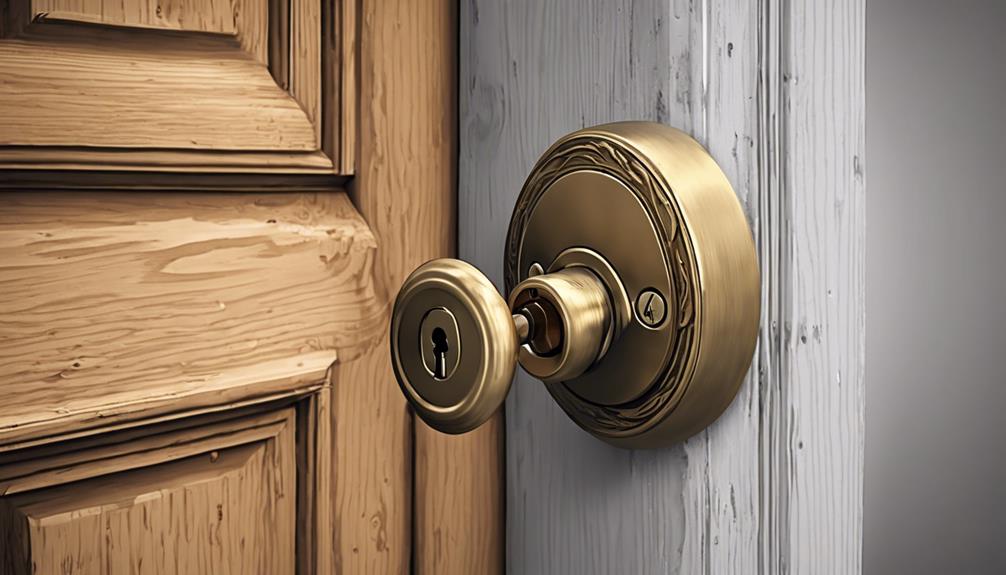
When replacing traditional locks, it's essential to assess the age and condition of the existing lock to determine if a replacement is necessary. Consider the level of security needed for the location and the door where the lock will be installed. Additionally, make sure the new lock is compatible with the specific type and material of the door to guarantee proper functionality and security. It's also important to evaluate the security needs of each area and the compatibility of the lock with the door type and material for effective security. How To Choose Locks For Different Areas Of Your Home
Lock Age and Condition
As locks age, their reliability can diminish over time due to wear and tear. To guarantee your traditional lock serves you well, knowing when it's time to replace it is essential. Below are some signs that indicate your lock might be past its prime:
| Signs of Aging Locks | Description | Action |
|---|---|---|
| Rust buildup | Corrosion on metal parts | Consider replacing to prevent further damage |
| Loose or wobbly handle | Difficulty turning key | Tighten screws or replace if necessary |
| Key jams | Key getting stuck | Lubricate lock mechanism or call a locksmith |
Keeping an eye out for these indicators and following basic maintenance tips can help extend your lock's lifespan and keep your property secure.
Security Level Needed
As locks age and show signs of wear and tear, it becomes essential to contemplate the security level needed for your property. When considering the security threats in your area, it's vital to balance them with user convenience. Traditional locks offer varying levels of security, from standard pin tumbler locks to high-security options like deadbolts. If you live in a low-crime neighborhood, a basic lock might suffice, but in areas prone to break-ins, investing in a more robust lock system is wise. Upgrade Your Locks to enhance security measures and deter potential intruders. While high-security locks provide excellent protection, they might require more effort for installation and maintenance. Ultimately, finding the right security level involves weighing the risks and benefits while ensuring your peace of mind and property's safety.
Compatibility With Door
Considering the compatibility of a lock with your door is essential to confirm proper functionality and security. When selecting a traditional lock, you must take into account the type of door you have. Different door types, such as wood, metal, or fiberglass, may require specific lock materials to guarantee a secure fit. For instance, wooden doors may be better suited for certain types of locks compared to metal doors due to variations in construction. Additionally, the thickness and dimensions of your door will impact the type of lock that can be successfully installed. By understanding your door's characteristics and requirements, you can choose a lock that not only fits properly but also enhances your overall security measures. Make sure to check out the Choosing the Perfect Lock for Your Home Security Needs guide for more insights on selecting the ideal lock for your home.
Factors to Consider for Smart Locks
When choosing a smart lock for your home, it is vital to carefully assess several key factors to guarantee you select the right one for your needs. One important aspect to take into account is the user experience offered by the smart lock. Verify that the lock's interface is user-friendly and intuitive, providing a seamless interaction for you and your family members. Additionally, look for smart locks that offer efficient app integration, allowing you to control access to your home remotely and monitor who enters and exits. The convenience of being able to manage your lock from your smartphone adds a layer of security and ease to your daily routine. Prioritize user experience and app integration when selecting a smart lock for your home. Don't forget to check out the Smart Lock Buying Guide for more detailed information on choosing the right smart lock for your needs.
Factors to Consider for Electronic Locks
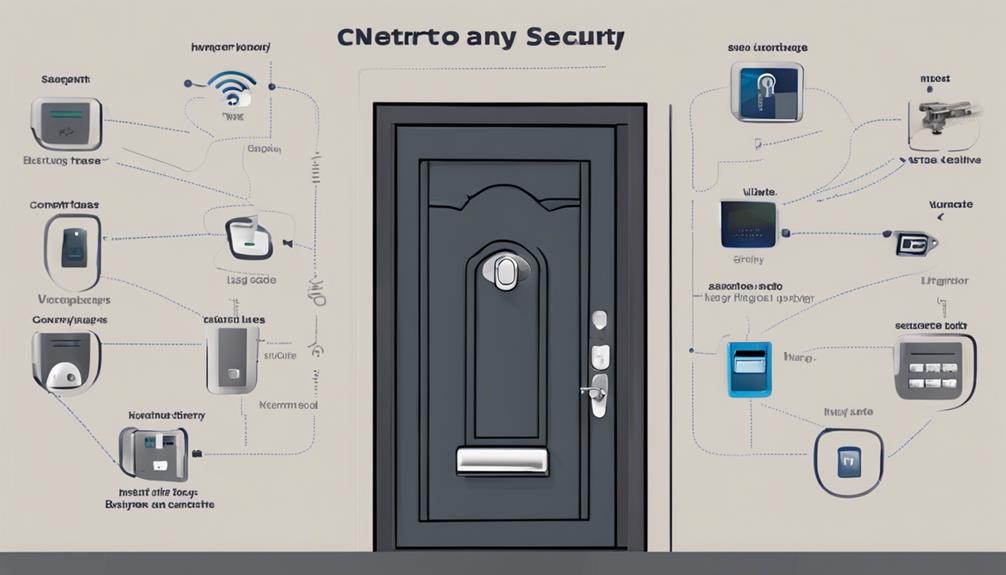
To enhance the security of your home further, exploring the domain of electronic locks can provide added convenience and control over access to your property. When considering electronic locks, take into account the following:
- User Experience: Opt for electronic locks with user-friendly interfaces for smooth operation. When looking at user-friendly interfaces, consider smart locks that offer re-keying or reprogramming options for added security customization.
- Installation Costs: Factor in the cost of professional installation versus DIY options.
- Remote Access: Look for locks that offer remote access features for added flexibility.
- Integration: Consider electronic locks that can integrate with your existing smart home devices for a seamless experience.
Factors to Consider for High-Security Locks
What key factors should you prioritize when selecting high-security locks for your property? When it comes to high-security locks, two critical aspects to take into account are cost implications and installation challenges. High-security locks are an investment in your property's safety, so be prepared for a higher initial cost compared to traditional locks. However, this cost is justified by the advanced security features these locks offer. If you want to learn more about the features and benefits of high-security locks, check out Unlocking Safety: The Advantages of High-Security Locks. Additionally, high-security locks may present installation challenges due to their intricate mechanisms. It's advisable to hire a professional locksmith experienced in installing high-security locks to guarantee proper functioning. While the initial cost and installation challenges may seem intimidating, the peace of mind and heightened security these locks provide make them a worthwhile choice for protecting your property.
Conclusion
To summarize, upgrading your locks to smart, electronic, or high-security options can greatly enhance the security of your home or office. For example, by installing a smart lock with keyless entry, you can easily monitor who enters and exits your property, providing peace of mind. Consider your specific security needs and explore the various types of locks available to find the best fit for your protection requirements.

